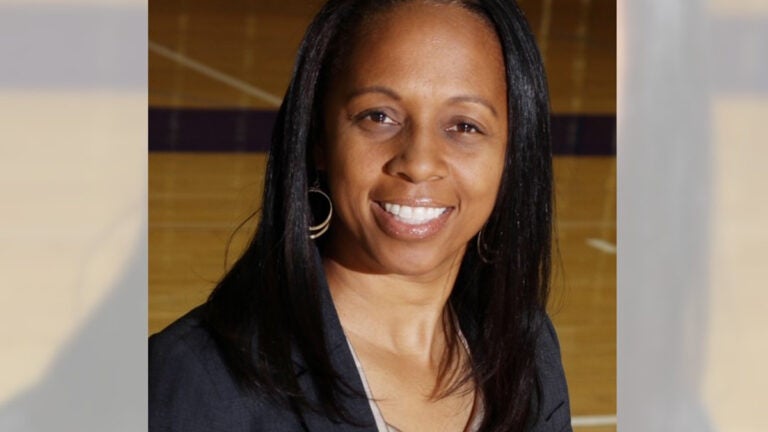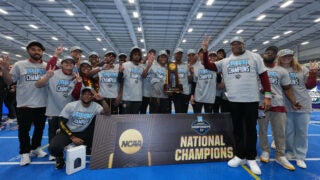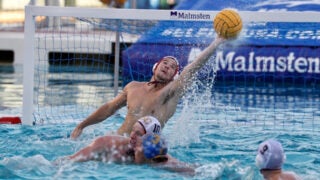
The Women of Troy: How USC’s female student-athletes are using their voices and making history
As Women’s History Month wraps up and the 50th anniversary of Title IX approaches, USC Athletics’ Julie Rousseau discusses the role of women student-athletes in the fight for equality.
Julie Rousseau has been a student-athlete, a college and professional head coach, and an educator. She coached the Los Angeles Sparks before serving as an assistant coach at Stanford University and head coach at Pepperdine University. In 2020, she was chosen to head up the USC Athletics Black Lives Matter Action Team.
Now associate athletic director for diversity, equity and inclusion, Rousseau is spreading the word about the Women of Troy, an affinity group within the athletic department devoted to promoting and developing USC’s renowned women’s athletics program. Rousseau, who’s also an adjunct professor of gender and sexuality studies at the USC Dornsife College of Letters, Arts and Sciences, is planning events to mark the 50th anniversary of Title IX, which prohibits sex-based discrimination in educational programs or activities that receive federal assistance.
As Women’s History Month wraps up and the anniversary of the passage of Title IX approaches, USC News spoke to Rousseau about the role of women student-athletes in the fight for equality.
Why are women’s athletics such a fundamental part of women’s history and of USC history?
I believe we’re at a very pivotal time in women’s sports. Last month, women soccer players reached a $24 million settlement with the U.S. Soccer Federation after an unequal pay lawsuit. And the WNBA celebrated its 25th year in 2021. These are examples of progress.
There is still work to be done. For example, at last year’s NCAA Tournament, huge disparities between the women’s teams and the men’s teams were exposed in terms of the disparities between the men’s and women’s weight rooms, the swag bags, food, COVID testing protocol, and so on. That was followed by the release of the Kaplan report, which documented major inequities in NCAA basketball. Women’s History Month gives us a chance to celebrate all of the history and historical figures that have enabled us to be in this space, while also allowing us to ask, “What else remains to be done?”
Women’s History Month gives us a chance to celebrate all of the history … while also allowing us to ask, ‘What else remains to be done?’
Here at USC, we’re in the middle of a six-month campaign from January to June where we’re highlighting some of that history as we approach the 50th anniversary of Title IX on June 23, 2022. And on International Women’s Day this month, we relaunched the Women of Troy, which has been synonymous with our female student-athletes here at USC for many years.
I recently interviewed Barbara Hedges, USC’s first female athletic director after Title IX was enacted in 1972. She began her USC career as an associate athletic director in 1973, overseeing the Women of Troy to 13 national championships; then she became a senior associate athletic director in 1989. Obviously, the early ’70s was a difficult period. They were making a major transition from women’s sports being thought of as “play days” when women could play sports, but they weren’t thought of as competitive. They didn’t even keep score. Their sports participation was thought of as a way for women to stay active and physically strong for childbearing.
Fast forward to the passage of Title IX, and now women have opportunities to compete and earn college scholarships. Hedges was very firm that women athletes at USC were going to be called the “Women of Troy”; they weren’t going to be called the “ladies.” The Women of Troy exemplified strength, as opposed to some of the social norms associated with being a lady.
The return of the Women of Troy is part of our work to advance our female student-athletes and the contributions they make to Trojan Athletics. They want people to see them as fully capable women who are going to compete at the highest level, and to see the intersections between the Black woman’s experience, the Asian woman’s experience, Latinx women and LGBTQI women.
Looking back over those 50 years and how far we’ve come since Title IX, what are the possibilities for a woman who comes to USC to compete as a student-athlete?
The possibilities are far better. But I think that there are still some disparities that are very evident to our young women. So, whether it’s visibility on our social media sites or our websites, these are areas that our women are saying, “Hey, we’re working just as hard as men.” These are the things that our women are continuing to fight for.
I teach a gender and sexuality studies class that centers the voice and experience for female student-athletes of color. We ask the students how they’d improve the female student-athlete experience here at USC. Each time two themes emerge. First, that we need to value women in all the intersections that they bring — the full humanity of that woman, not just her gender. And the other theme is that there should be more opportunities for women’s accomplishments to be celebrated, highlighted and featured on campus and on various platforms.
Our female student-athletes have some major confidence and swag. There are some powerful young women here.
And that’s an area in which our Women of Troy affinity group is working. We want to create these opportunities for women to have safe spaces to have these conversations. In Heritage Hall, there is a lounge that is dedicated to our female student-athletes. The creation of that space says, “We see you; we welcome you.” Obviously, a lot still needs to be accomplished. That includes using opportunities like Women’s History Month to celebrate our athletes and to bring attention to disparities so that we can keep getting better.
I should add that our female student-athletes have some major confidence and swag. There are some powerful young women here. Whether it be on the field of play or in any arena where they find themselves, there’s a confidence that our young women have. I think playing sports does that for them.
How about you? Did your participation in sports give you confidence?
When I was a young girl, I was the first girl to play on an all-boys baseball team. I just used my initials — J.R. — and I had a big afro. The other teams did not know because girls were not allowed to play on the boys team. I was undercover. My teammates and coaches knew I was a girl and knew I could play well, so they wanted me on the team. My dad said, “If she is not recognized as Julie, then she can’t play next year.” And they changed the rules.
That kind of support you get from your parents and other family members is critical. I think that when women do get a chance to be physical and test the limits of their own bodies and be competitive, there’s a sense of assurance that grows within when you’re able to perform on a field of play. The world is constantly trying to diminish some of their confidence, and we want women to be respected and supported for how they compete. Our women’s basketball is a different sport from men’s basketball in the sense that it’s played differently, below the rim. But it’s still great basketball.
Women athletes are more vocal than ever that they want to be acknowledged for what they bring. They want to be treated the same in terms of opportunities given to their male counterparts. They’re saying, “I want to be seen,” and that they deserve more.
You’ve mentioned several times that participating in athletics gives women confidence. What are some of the other benefits for girls and women participating in sports?
There are data that shows that girls who play sports tend to be more successful in several other ways. They have higher self-esteem, more positive body image, and they’re less likely to drop out of school. They’re less likely to get pregnant at an early age and are more likely to attend and finish college.
Our female athletes are saying, ‘I’m more than just my gender. I’m more than this female body that you see, and I have more to contribute than just the unique female experience. I’m more than just my race and my sexuality.’
But the space we are in now, where we are more committed than ever to diversity, equity and inclusion, tells us that just thinking about gender is not enough. Our female athletes are saying, “I’m more than just my gender. I’m more than this female body that you see, and I have more to contribute than just the unique female experience. I’m more than just my race and my sexuality.”
We have to use that intersectional lens to fully understand their identities and ways we can help them achieve their dreams.
Is there anything else you want to add about where women’s athletics are now versus 50 years ago?
Women athletes went from being out of place, like interlopers who are not really welcome or seen, to being at a point where some are world-famous, and they’ve achieved a level of recognition where they’re beginning to use their voices to make change. I applaud the women who have shown bravery and used their platforms to make it better not only for themselves, but for the generations to come.
One final thing I want to add, which is something the students in my class contributed to this ongoing discussion. It is evident that we need men to help change the narrative by supporting women in their fight for equal rights and equal opportunities. And it’s happening. For example, the support the NBA players have been giving to the WNBA is critical. When little boys begin to see that it’s cool to go watch the WNBA and that they’re competing just as hard — that’s when we achieve real change.



